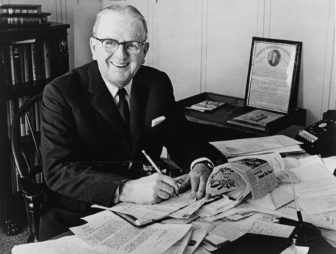(RNS) — Norman Vincent Peale, the famed evangelist of positive thinking, had some advice for people when they or a loved one got sick.
Call your doctor.
Call your preacher.
And don’t worry too much.
“Whatever you do, do not become panicky or filled with fear,” wrote Peale, in his bestselling spiritual guide, “The Power of Positive Thinking,” “for if you do, you will send out negative thoughts and therefore destructive thoughts in the direction of your loved one when he requires positive and healing thoughts to assist him.”
President Trump, an acolyte and erstwhile parishioner of Peale’s, appears to be putting that advice into practice.
“Don’t be afraid of Covid,” Trump tweeted on Monday (Oct 5.) in announcing that he was planning to leave Walter Reed Naval Hospital. “Don’t let it dominate your life.”
RELATED: The president, the pandemic and the limits of positive thinking
Peale’s positivity also appears to be guiding the president’s doctors, given the messages about his health that they shared with the press over the weekend.

Norman Vincent Peale, shown in 1966, was a Christian preacher and author, most notably of “The Power of Positive Thinking.” Photo Roger Higgins/World Telegram/Creative Commons
White House physician Sean Conley admitted to putting a positive spin on the president’s condition over the weekend, an approach that backfired.
“I didn’t want to give any information that might steer the course of illness in another direction, and in doing so, you know, it came off that we were trying to hide something, which wasn’t necessarily true,” he told reporters on Sunday (Oct. 4).
André Gagné, professor of religion at Concordia University in Montreal, said Peale’s focus on positive thinking is part theology and part “autosuggestion.” It draws on Bible verses such as Philippians 4:13, where the Apostle Paul states that he can do “all things through Christ who strengthens me.”
This approach can lead to downplaying any bad news.
“Trump thinks that by repeating only positive things, be it about his health, wealth or political situation, everything will turn out for the best,” said Gagne. “This, of course, is seen in his attitude towards COVID-19. Projecting an image of strength and of ‘being in control’ is clearly a result of this kind of thinking.”
The flip side of positive thinking also applies. Focusing on the negative, Peale argued, leads to bad outcomes.
Kate Bowler, author of “Blessed, a History of the Prosperity Gospel,” describes what she calls “negative confession” — the idea that acknowledging bad news can be a sign of disbelief.
That can be especially true when speaking about a believer’s health, writes Bowler, associate professor of the history of Christianity in North America at Duke Divinity School.
Bowler told Religion News Service in an email that Trump’s beliefs likely make it hard for him to admit when thing do go wrong.
“Trump’s implicit and explicit beliefs in a gospel of health and wealth and victory will make it very difficult for him to admit loss or illness of any kind,” she said. “His is a ‘winner take all’ worldview where any limitation is going to be interpreted as a failure, which he can’t tolerate in others or himself.”

President Donald Trump speaks about the coronavirus in the James Brady Press Briefing Room of the White House on March 31, 2020, in Washington, as Vice President Mike Pence and Dr. Deborah Birx, White House coronavirus response coordinator, listen. (AP Photo/Alex Brandon)
But Darnise Martin, associate professor of African American Studies at Loyola Marymount University, believes Trump is missing the point. Positive thinking doesn’t mean ignoring when things go wrong.
A practitioner of New Thought, a spiritual movement that maintains that our thinking affects the world around us, Martin sees echoes of this ethic in Trump’s persistent confidence that everything is going to work out great. But Martin said he uses positive thinking more as a personal pep talk than a spiritual practice.
“So everything is great,” she said. “You are doing a good job. Just go out there, despite what is, as we say.”
She said that positive thinking is part of New Thought teaching. But it’s not the whole thing. There’s also an outward focus, she said, that President Trump is missing.
“This is where we see it go awry,” she said. “It becomes, in this case, very narcissistic.”
He also misses how to deal with failure. When things go wrong, the universe is trying to tell you that you need to pay attention and make changes, especially if other people are harmed by your actions.
“It’s a self-serving misapplication of the doctrine that he won’t even look at the consequences upon others,” Martin said. “We don’t teach that you should ignore things. We teach the healing of things and the transforming of things — which is different than saying it doesn’t exist.”
Martin said positive thinking has worked for Trump because it has opened up opportunities for him. The problem, she said, is that he has failed to take advantage of those opportunities to do good and seemingly has no plan about how to actually accomplish things.
“He doesn’t know how to manage this,” she said. “He doesn’t know how to manage greatness.”
Martin said that Trump’s misuse of positive thinking and other self-centered uses of the teachings of New Thought is a problem for the New Thought movement. She said that she and other leaders need to do a better job at articulating their beliefs.
“This reveals to us of the work we have to do,” she said.





